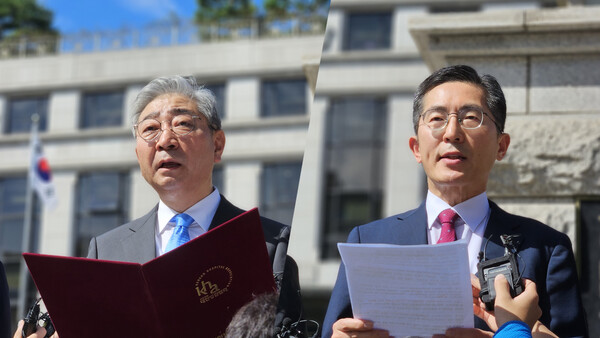The Korean Medical Association (KMA) and the Korean Hospital Association (KHA) have petitioned the Constitutional Court to review and temporarily halt the enforcement of the revised medical law, which mandates the installation of closed-circuit TV (CCTV) cameras in operating rooms from Sept. 25.

The revised medical law stipulates that CCTVs must be installed in ORs where surgeries are performed on unconscious patients. Upon request, surgical procedures must be recorded. However, the law will not apply to critical surgeries that can't be delayed or procedures deemed necessary to save a patient's life.
Passed by the National Assembly on August 31, 2021, the law has been given a grace period of two years and is set to be enforced from Sept. 25.
Speaking in front of the Constitutional Court on Tuesday, KMA President Lee Pil-soo and KHA President Yoon Dong-sup argued that mandating CCTVs infringes upon the basic rights of medical professionals, leading to avoidance of surgeries and defensive medical practices, which ultimately harms the public.
They said the mandatory installation of CCTVs in ORs violates the basic constitutional rights of healthcare professionals, including freedom of occupation and personality rights.
The two also emphasized that CCTVs in ORs not only portray doctors as potential criminals but also worsen the surgical environment, adversely impacting patients.
"This poses a threat to the public's right to health," the two groups said in a statement. "We urge the Constitutional Court to make a wise decision."
However, some doctors criticized the two groups for acting too late.
Addressing these concerns, KMA's Executive Board Member Choi Chung-hee, explained to reporters that KMA had already discussed with lawyers when would be the best time to file the constitutional petition.
Regarding the ultimate decision, Choi stressed that the goal is obviously to receive a ruling that mandatory CCTVs in ORs are unconstitutional.
"However, even if the court decides it's constitutional, it provides an opportunity to make the public more aware of the dangers of mandatory CCTV installation," she said. "If the decision isn't unanimous, we can anticipate dissenting opinions from the judges, and these opinions can influence alternative solutions for system improvements in the future."
It's a meaningful attempt, and both the KMA and KHA will do their best to achieve the outcome the medical community desires, she added.
Guidelines on operating room CCTV already released
According to the medical community on Monday, the Ministry of Health and Welfare (MOHW) has produced and shared guidelines for operating room CCTV installations that reflect the issues at stake.
According to Article 38-2 of the Medical Law, medical institutions performing surgeries on unconscious patients, such as under general anesthesia, must install CCTVs in accordance with the Personal Information Protection Act and related laws.
In the guideline, the MOHW clarified the definition of "unconscious patients" and "operating rooms."
"While sedation can also lead to a state of unconsciousness, it can occur in places other than operating rooms, such as endoscopy rooms and examination rooms," the ministry's guideline read. "The Ministry distinctly limited the concept of the operating room in the law to the operating room listed in the Enforcement Rules of the Medical Act, which is different from recovery rooms, treatment rooms, and clinical examination rooms."
Also, for procedures where patients are rendered unconscious, including through sedation, CCTVs must be installed, provided the patient doesn't retain awareness or memory of the procedure. Local anesthesia that doesn't impact patient consciousness is excluded.
The ministry added, "Places other than operating rooms are not subject to mandatory CCTV installation." For those wishing to install cameras in places like imaging rooms, they should refer to the Personal Information Protection Act and related guidelines.
Related articles
- Confusion persists as hospitals prepare CCTVs in operating rooms
- Are Korean hospitals still leading medical digitalization?
- ‘Shortage of anesthesiologists blamed for 4-year-old girl’s tragic death during surgery’
- Hospitals ask for delaying CCTV checks due to installation rush
- Will operating room CCTVs become useless due to ‘consent issue’?

